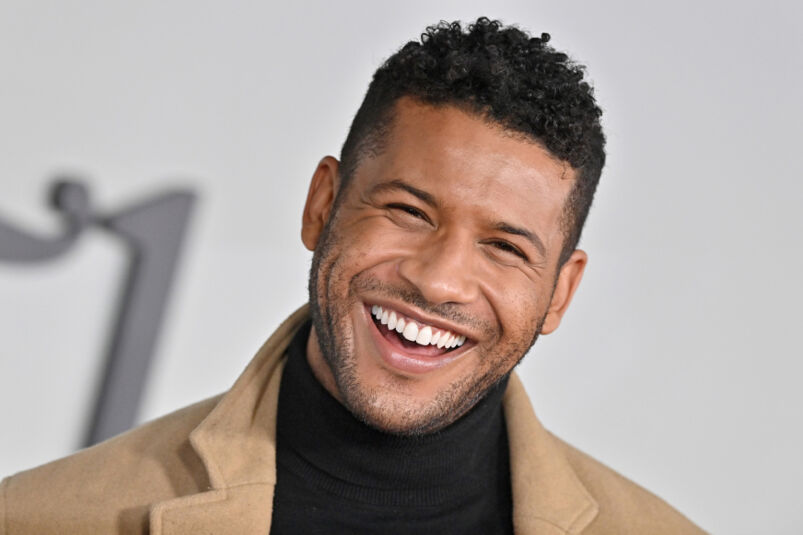
Jeffrey Bowyer-Chapman is living the dream.
Known for his work on seminal queer TV series like Noah’s Arc, The L Word, and the global Drag Race franchise, the actor’s current role on Disney+’s Doogie Kameāloha, M.D. finds him living and working in gorgeous Honolulu, Hawaii for a few months out of the year.
But even more than the sun and the sand, what Bowyer-Chapman has most loved about filming on the island of Oahu has been the chance to educate himself on the native Mahu culture, a rich history and community of trans and nonbinary people.
In turn, he’s been able to work with the team behind Doogie Kameāloha to weave that culture into the show, which he calls a literal dream come true.
“It is the honor of a lifetime to be able to bring to life some of those themes and storylines to this new generation on a Disney show,” Bowyer-Chapman tells us. “When young queer kids turn on their televisions, they can finally see a reflection of themselves and their stories being shone back at them in a positive and true light.”
With the second season of Doogie Kameāloha, M.D., we took that opportunity to get Bowyer-Chapman in the hot seat as the latest guest in our rapid-fire Q&A series, Dishin’ It. In our conversation, the star talks more about the impact Mahu women have had on his life, his early Home Improvement crush, and the film he’s proudest of that he hopes more people get a chance to see.
Is there a piece of media—whether a movie, TV series, book, album, games, etc…—that you consider a big part of your own coming-out journey, or that has played an important part in exploring your own queerness? Why does it stand out to you?
Anyone who knows me knows how pivotal a role Buffy The Vampire Slayer played in my formative years. Long before there were any explicitly queer storylines, the theme of otherness that ran through the veins of the show left me feeling much less alone in the world, and truly was the inspiration behind me choosing to become an actor.
Your series, Doogie Kameālloha, films in Honolulu—what’s your favorite part about visiting/working on Oahu? Do you have a favorite gay bar there or queer-friendly spot?
My favorite part about filming on Oahu, is being in the presence of such a rich history and reverence for Mahu people and Mahu culture, which is a Hawaiian word for Transgender. My wardrobe woman on Doogie, Erika Aresta, has become my best friend on the island, is a wealth of knowledge on the Mahu experience and has taught me more than I dreamt possible.
Visiting the healer stones of Kapaemahu in Waikiki is a spiritual experience beyond words, and simply spending time with Erika and her chosen Ohana of Mahu women, listening as they talk story about the impact Mahu women have had in Hawaiian and Polynesian culture for centuries is truly the greatest gift.
Where’s one of the first places/spaces you can remember that made you feel a part of a queer community?
It took a long time for me to feel comfortable and safe in queer spaces. There were two occasions in which I felt celebrated and accepted into the community as opposed to simply being objectified or fetishized as a Black man. The first was Gay Pride Weekend in Cape Town, South Africa. The second was Gay Pride in New York City.
Both of those experiences were in my early twenties and they marked the first time I felt like not only did I not stand out, but I really became one with my people in a way I never dreamed possible.
From Noah’s Arc to The L Word to Drag Race and American Horror Story, you’ve been involved in tons of iconic queer projects over the years. But is there a role you’re especially proud of that you consider to be under-seen or under-appreciated?
I did a movie called Spiral that was released during the height of the pandemic, and it’s one of my favorite projects and characters I’ve played. It’s a psychological thriller set in the ’90s, but the cultural themes of racism, classism, and fear of otherness are just as relevant today.
My character Malik has such a special place in my heart, because he’s a grown man navigating his way through an unsafe world for a Black, Queer person and the lens through which he sees the world is that of someone who experienced a lot of trauma in their youth stemming from his race and sexuality. Something I could easily connect with.
It always makes me so happy when people from all walks of life tell me they’ve seen it, and how much that film has meant to them.
Who’s a fictional character you had a crush on at a younger age? What do you remember loving about them?
Jonathan Taylor Thomas’ character Randy on Home Improvement was my first TV crush. He was one of very few TV stars around my age at that time who didn’t read explicitly as white. It was rare for me to see a reflection of myself when I turned on the television, and although he wasn’t Black, what he was doing with his career going from tv to film to voiceover and animation, I had to see it to believe what was possible for myself, and in a very roundabout way he represented that possibility for me.
You started modeling in your teens, and then got into entertainment at a young age. In an alternate universe where you didn’t pursue acting, what career do you think you might have instead?
I think if I weren’t acting, I would’ve pursued social work or teaching in some capacity. I love learning and sharing new ideas and ways of thinking with young minds.
I was raised in an educational environment where free thinking was not encouraged and it was only through expanding my own consciousness finding the writings of people like Maya Angelou, Harper Lee, and J.D. Salinger that I realized there was a beauty to life that could only be experienced by finding the courage within to break the oppressive rules society imposes on us, and creating the life of your own dreams.
Related:
Jeffrey Bowyer-Chapman on representing his chosen family in ‘Doogie Kamealoha, M.D.’
“It’s never been about fame for me. It’s about the stories we are telling and the impact of these characters.”
Who is a queer or trans artist/performer/creator that you think is doing really cool work right now? Why are they someone we should all be paying attention to?
My friend Ronan Farrow is someone who is consistently blowing my mind at his ability to speak truth to power and call out injustice in this industry in ways that not only have people paying attention, but actively causes change where it’s been desperately needed for decades. Sexual abuses are a longstanding tradition in the entertainment industry, and there thankfully are laws to protect people from such heinous acts.
Emotional abuse and bullying are not as easily identifiable or legally protected, but through Ronan’s work of unearthing some tragic truths about the ways bad behaviors have been not only tolerated, but widely accepted in Hollywood for generations, he’s bringing to light what has existed in darkness for far too long, and now that we can see it for what it is, we can do what is necessary to protect ourselves and generations to come from emotional trauma in the workplace.
*Scroll down for more pics from Bowyer-Chapman’s Instagram page…

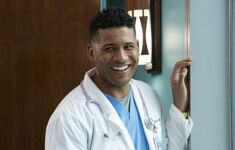















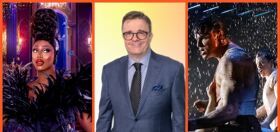


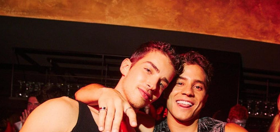
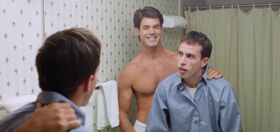
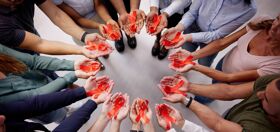

Kangol2
I can’t really speak about his acting but he’s beautiful so I’m sure there’s some role someone can find for him. More Jeffrey Bowyer-Chapman, please.
myloginname
That man is so handsome.